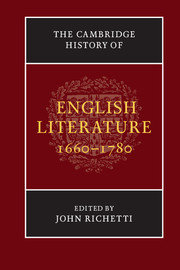Book contents
- Frontmatter
- Introduction
- PART I LITERARY PRODUCTION AND DISSEMINATION: CHANGING AUDIENCES AND EMERGING MEDIA
- PART II LITERARY GENRES: ADAPTATION AND REFORMATION
- 5 Restoration and early eighteenth-century drama
- 6 Dryden and the poetic career
- 7 Political, satirical, didactic and lyric poetry (I): from the Restoration to the death of Pope
- 8 Eighteenth-century women poets
- 9 Systems satire: Swift.com
- 10 Persistence, adaptations and transformations in pastoral and Georgic poetry
- 11 Political, satirical, didactic and lyric poetry (II): after Pope
- 12 Drama and theatre in the mid and later eighteenth century
- 13 Scottish poetry and regional literary expression
- PART III LITERATURE AND INTELLECTUAL LIFE: THE PRODUCTION AND TRANSMISSION OF CULTURE
- PART IV LITERATURE AND SOCIAL AND INSTITUTIONAL CHANGE
- PART V LITERARY GENRES: TRANSFORMATION AND NEW FORMS OF EXPRESSIVENESS
- PART VI CONCLUSION
- Chronology
- Bibliographies
- Index
- References
6 - Dryden and the poetic career
from PART II - LITERARY GENRES: ADAPTATION AND REFORMATION
Published online by Cambridge University Press: 28 March 2008
- Frontmatter
- Introduction
- PART I LITERARY PRODUCTION AND DISSEMINATION: CHANGING AUDIENCES AND EMERGING MEDIA
- PART II LITERARY GENRES: ADAPTATION AND REFORMATION
- 5 Restoration and early eighteenth-century drama
- 6 Dryden and the poetic career
- 7 Political, satirical, didactic and lyric poetry (I): from the Restoration to the death of Pope
- 8 Eighteenth-century women poets
- 9 Systems satire: Swift.com
- 10 Persistence, adaptations and transformations in pastoral and Georgic poetry
- 11 Political, satirical, didactic and lyric poetry (II): after Pope
- 12 Drama and theatre in the mid and later eighteenth century
- 13 Scottish poetry and regional literary expression
- PART III LITERATURE AND INTELLECTUAL LIFE: THE PRODUCTION AND TRANSMISSION OF CULTURE
- PART IV LITERATURE AND SOCIAL AND INSTITUTIONAL CHANGE
- PART V LITERARY GENRES: TRANSFORMATION AND NEW FORMS OF EXPRESSIVENESS
- PART VI CONCLUSION
- Chronology
- Bibliographies
- Index
- References
Summary
Three hundred years after Dryden's death nothing could be more obvious than the breadth and authority of his career. He is the most important poet of the late seventeenth century. He perfected the heroic couplet and deployed the idioms of literary mockery with unprecedented skill and originality; he wrote masterful Pindarics (metrically varied odes, so called after the Greek poet, Pindar) and beautiful commemorative verse; he wrote the greatest political satire of the language; and he absorbed and translated the idioms of Latin poetry over an entire lifetime, creating an English Virgil that for some, even now, has no rival. If we add Dryden's work as playwright and literary theorist to his accomplishments as poet and translator, we might wonder if there is, in the early modern period, another career so various and fecund. Dryden invented, perhaps not quite from whole cloth, the heroic drama; together with Purcell he fashioned an English opera; after Sidney's Defence (1595), Dryden's Essay of Dramatic Poesy (1668) is the defining text of the early modern literary imagination. And no one – not Milton or Marvell, not Browne or Burton, not even Clarendon – could touch the subtlety, the mastery and the ironies of Dryden's prose.
Yet the retrospective view – from the beginning of the twenty-first century, or indeed from the late 1690s, back over four decades of tremendous literary industry – gives a kind of logic to this literary life that would have been difficult to see as it was under construction, a coherence that belies how little was or could have been planned, how much was opportune and adventitious.
- Type
- Chapter
- Information
- The Cambridge History of English Literature, 1660–1780 , pp. 132 - 159Publisher: Cambridge University PressPrint publication year: 2005

